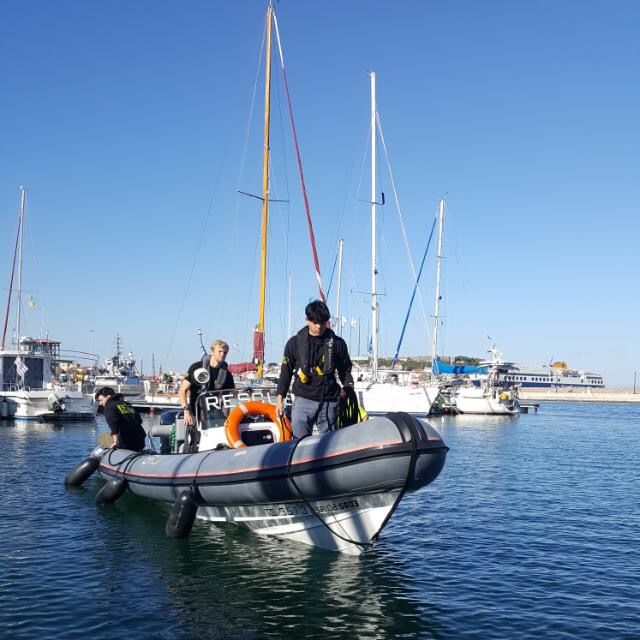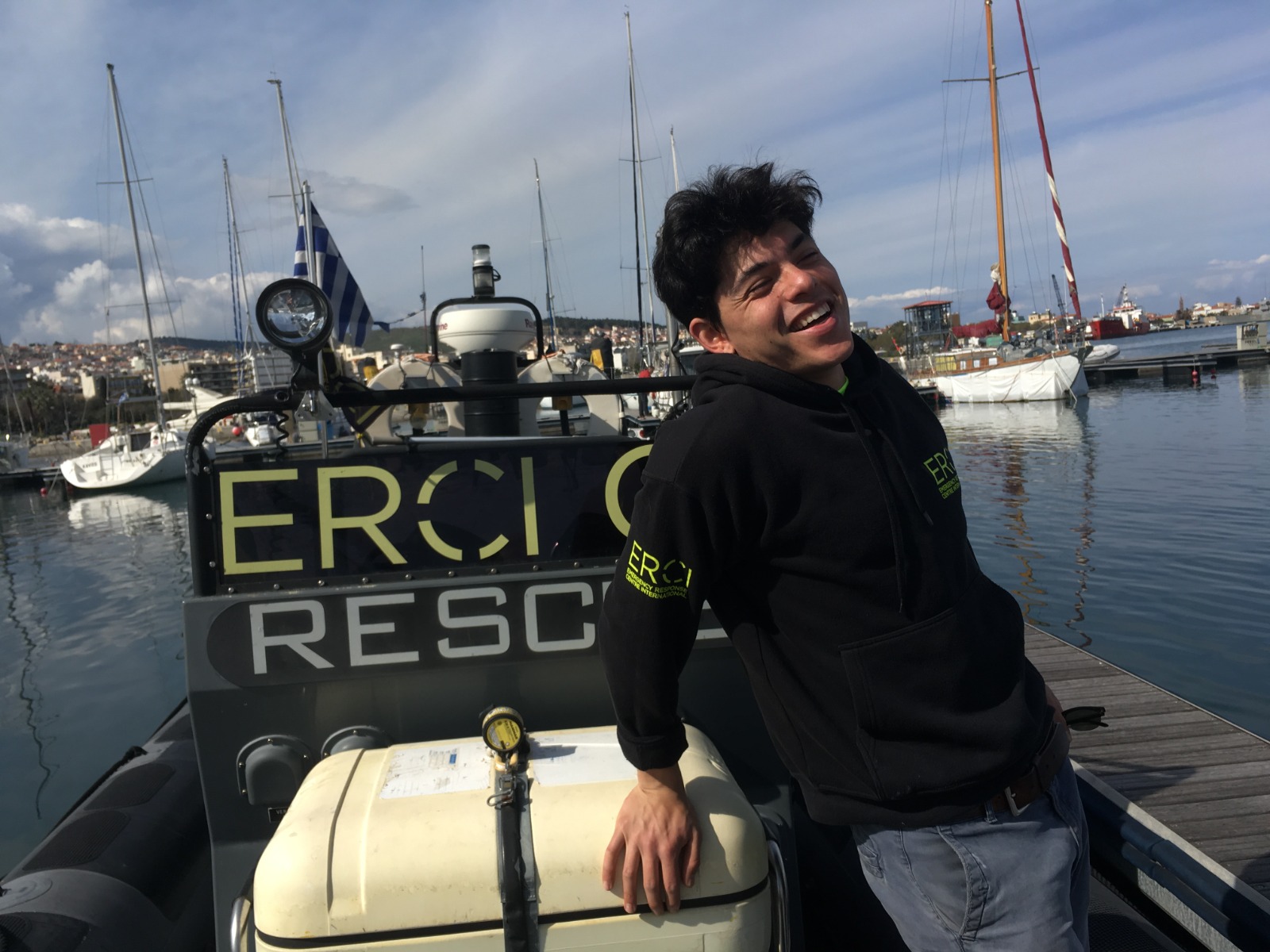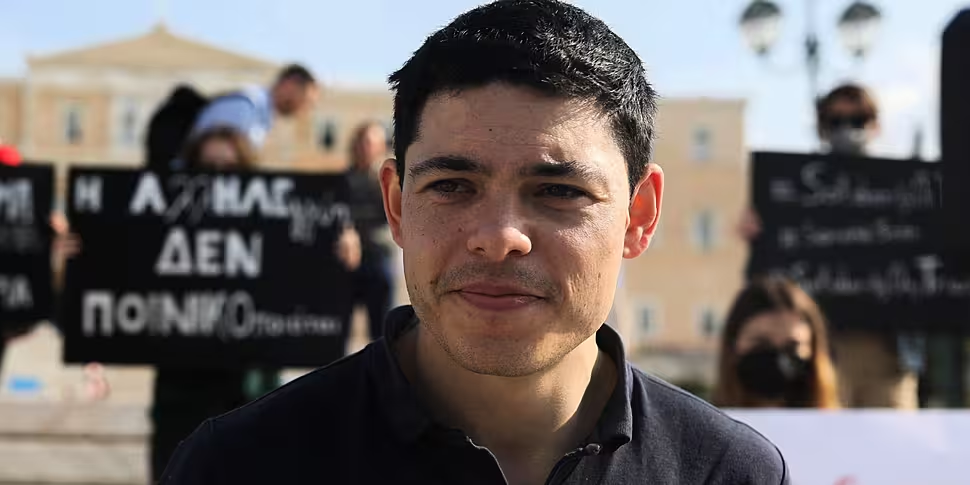An Irishman facing trial in Greece has said he does not regret going to help refugees who arrived on the island of Lesbos.
Seán Binder, an Irish and German citizen who is from Castlegregory in Co Kerry, is a certified rescue diver who spent time rescuing migrants and refugees from the sea.
The trial, which is due to be held at the Court of Appeals of Northern Aegean on Tuesday, was previously adjourned in November 2021 on procedural grounds.
It is expected the trial will take weeks or possibly months to conclude.
Syrian refugee and activist Sarah Mardini is also facing charges.
 Seán Binder (front) is seen on a rescue boat. Picture: Supplied
Seán Binder (front) is seen on a rescue boat. Picture: SuppliedAmnesty International is renewing its calls on the Greek authorities to drop all charges against them.
"They are facing unfair, baseless charges simply for helping refugees and migrants at risk of drowning at sea," the human rights group has said.
After Seán was arrested in August 2018, he spent more than 100 days in prison before being released on bail.
Seán told The Hard Shoulder he felt like he had to help.
"A lot of these boats that people arrive in are not seaworthy," he said.
"I've seen up to nearly 100 people crammed into a boat that might safely be designed for 15.
"That means that a lot of people can end up in danger, because under the cover of darkness - when these boats often depart - with almost no boating experience by anybody onboard, crammed into these conditions lives can be lost.
"On occasion, we really had to ensure people didn't die - but the vast majority of the time, and I really want to drive this point home, I did very little.
"I stood at the shoreline and I held a bottle of water in one hand and a blanket in the other, and I waited to see if somebody needed help."
'Facing 20 years in imprisonment'
Seán said more often than not he just smiled at the people who arrived.
"People are survivors - they have left conflicts infinitely more difficult than the journeys that I've ever undertaken, and so the little help that I could offer was often just a smile.
"Yet, for that very thing, I face 20 years in imprisonment.
"The main concern here is that if I can go to prison for offering a bottle of water and a smile to someone, then all of us are at risk of being criminalised for offering the basic of human kindnesses to people".
View this post on Instagram
Seán said such volunteering should not be necessary, but it is.
"In a better world, the authorities would be doing search and rescue and offering excellent care," he said.
"In the real world, 20-something-year-olds had to fill a gap that was being left, and through which people were falling and drowning".
'Encrypted communications'
He said it has never been made clear to him who he was supposedly spying for.
"There are two aspects to my supposed spying: I listened to encrypted communications, and that I used encrypted communications," he said.
"What the first one means is literally they're saying because the organisation had onboard a search and rescue vessel a maritime radio, that must mean that it was accessing illegal or encrypted communications.
"The Coast Guard themselves admitted [this] was impossible, given the fact that our radios were off the shelf."
Seán said the other charge of using encrypted communications "is WhatsApp."
'No one deserves to drown'
He said he has no regrets about going to help.
"I do not regret going to Lesbos - how could I?" he said.
"The question is this: If you arrive at the scene of a car accident and you see someone at risk of dying, what would you check first - their pulse or their passport?
"You would of course check their pulse first.
"If you've done that, like I would have done, then you've committed the same supposed crime that I am alleged to have committed.
"If we accept that I should not have been doing search and rescue, then we're abandoning the core values that we spend so much time and effort talking internationally about.
 Seán Binder is seen on a rescue boat. Picture: Supplied
Seán Binder is seen on a rescue boat. Picture: Supplied"These so-called European values of peace and justice: as soon as we're supposed to apply them internally we seem to forget to do so.
"I would always return to search and rescue because no one deserves to drown, and that is the core point," he added.
The upcoming trial relates to misdemeanour charges - including espionage and forgery.
Amnesty International has said they are also facing another ongoing investigation over "baseless charges of people smuggling, fraud, membership of a criminal organisation and money laundering" which carry a maximum sentence of 20 years.









